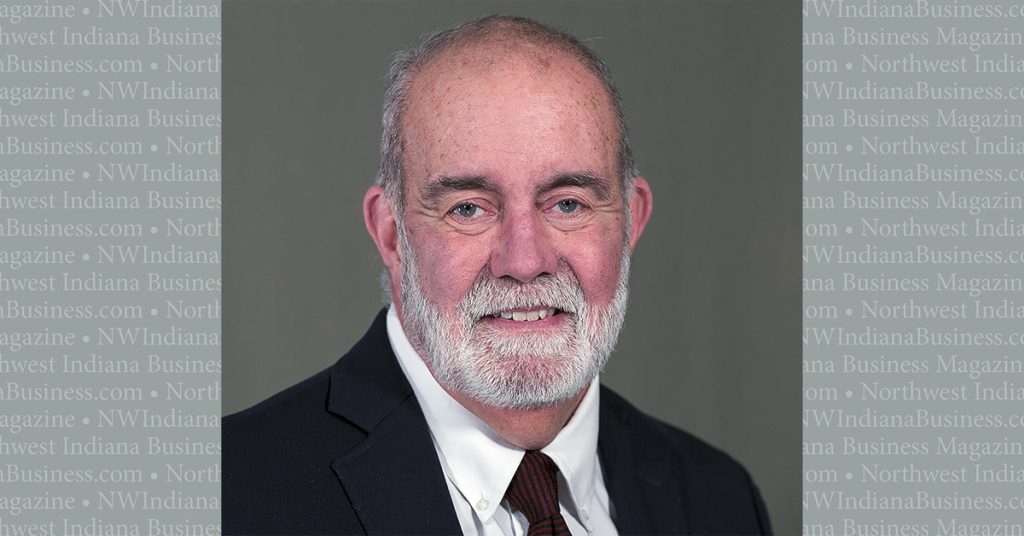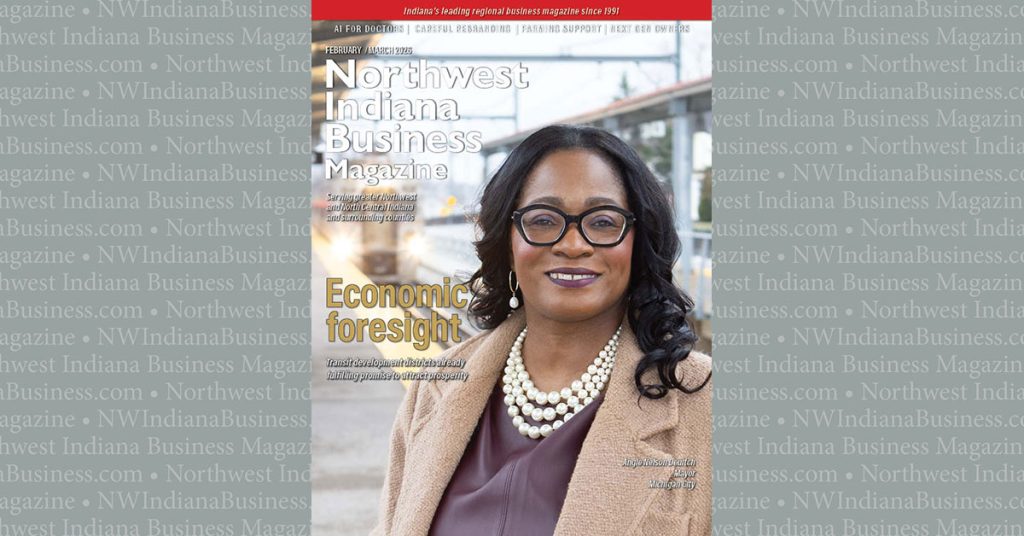
Sound business plans, long-term outlook
best way to navigate challenging economic times
Economic downturns come and go — as do political forces — but what stays the same is sound advice to stay the course, stick with business plans and keep long-term goals in mind.
That might sound logical, but Chris Janota said it’s hard not to consider the politics that are at play that impact the economy.
“It’s hard for folks to take their emotions out of it and make calm, informed, subjective decisions,” said Janota, who started his advisory firm in 2017.
For him, the kind of uneasiness business owners and entrepreneurs are feeling these days isn’t unique.
“Is this the hardest year? No, it’s not the hardest,” said Janota, president and financial adviser for Envoy Wealth Management based in Crown Point. “I mean, let’s face it. We did this before, four years ago. This is the second time around, so this is not a surprise or anything like that.”
The years 2008, 2020 and now 2025 have all been challenging years for the economy and for business owners.
The housing bubble sent the U.S. economy into the Great Recession in 2008.
The pandemic shut down shopping, working, schools and just basic life for millions of Americans in 2020.
And now 2025 brings market volatility and instability due to shifting economic policies.
Janota said it’s hard not to consider the politics that are at play that impact the economy. But he doesn’t shy away from factoring in political decisions and policies.
“It’s my job to talk about this stuff with folks but to do it from a subjective point of view, because one thing I tell my clients: Money is not red, money is not blue. Money is green, and it’s going to act independently of whatever you think is going on in Washington or whatever you think is going on in the stock market or the housing market,” he said.
From the price of gasoline to a dozen eggs, Janota said, business owners can get caught up in the headlines like everyone else.
John Lyon, a portfolio manager at Lyon Capital Management, tells his clients not to “react to the news cycle.”
“Making business or investment decisions based on proposed government policy is extremely difficult and extremely risky, and we avoid it almost entirely,” said Lyon, who opened his company’s Schererville office in early 2024. “As we have seen over the last couple of months, proposed policies can be negotiated, changed, abandoned, challenged or reversed, so making large adjustments to your strategy based on those proposals may prove futile.”
Earlier this spring those influences were a factor in a 1.6 point decline in the NFIB Small Business Optimism Index. The NFIB is a nonprofit that advocates for small businesses.
“Uncertainty continues to be a major impediment for small business owners in operating their business in April, affecting everything from hiring plans to investment decisions,” said NFIB Chief Economist Bill Dunkelberg, in a press release. “While owners are still trying to fill a high number of current job openings, their outlook on business conditions is less supportive of future business investments.”
Lyon said his investment advisory company was proactive in April and sent clients an email explaining their approach to limiting downside risk.
“We find that steadiness during a market decline is more calming than taking major actions,” he said.
Gina Ribota, a financial adviser with Edward Jones in Crown Point, is advising business owners not to panic during this time of uncertainty.
“Just as market volatility is never pleasant, it’s a natural aspect of investing,” she said.
Someone to listen
Michael Schneider, a senior vice president and commercial team lead for Wintrust Commercial Banking, has been advising clients for 25 years.
“We work with a lot of very broad range of businesses. A lot of what we do is commercial, industrial, your manufacturers, your service companies, all different sizes,” Schneider said. “Being a banker, part of what we do is advise our clients. We’ve got a lot of long-term clients that value being with us; they value our opinion as bankers because we deal with so many different types of clients and so many different industries.”
During times of uncertainty, Schneider advises companies to have a strong liquidity position, with cash on the balance sheet to help weather the storm.
It’s also important to have access to capital, Schneider said.
“A lot of times that can be a working capital line of credit to help kind of stem the tide,” Schneider said. “It’s good to get that kind of stuff established before you need it so it’s there when you need it.”
Schneider recommends that clients assess their expense structure and their overhead.
“When times are good and business and revenues are growing, it’s easy to add personnel, and maybe you’re not watching the expense numbers as closely. Because you’re having success and you’re growing in times where it’s uncertain,” Schneider said. “It’s not a bad idea to just kind of take a step back and look and see if your expenses have ballooned. Are there some areas where we can save some money and some expenses?”
Schneider said it’s also helpful to discuss “worst-case scenarios.”
“Hope is not a strategy. You can hope things get better or you can plan,” Schneider said. “Communication is always important.”
He said he prefers to talk to clients before it’s too late.
“If they’re having challenges, we absolutely love to sit down with them, and they shouldn’t be afraid to talk with us,” he said. “And I think sometimes clients have a hesitancy to come tell the bank that. … I would much rather have the opportunity to sit with our partners to help them, guide them, provide advice on the front end rather than trying to work things out on the back end when it might be too late to do the necessary planning.”
Lyon said downturns are often good for his business.
“We find that clients are very grateful for our expertise during a market downturn, and we often get more new customers during the down periods than when the market is booming,” he said.
Most importantly, Lyon has the chance to get to know his clients better.
“Building trust and credibility with customers during a difficult period can lead to much stronger and more enduring customer relationships for the years that follow,” he said.
Janota said he advises clients on everything from keeping track of fuel costs, tax issues and regulations.
“Sometimes it’s just being a voice of reason for someone,” Janota said. “It’s just being that person that they can pick up the phone and just bounce some ideas off of. I can help them do some research and get some stuff rolling.”
He’s happy to help them consider their options.
“Business owners don’t have time to think about this stuff, nor do they want to,” he said. “They have families at home.”
Plus, he said, they have employees and business operations to consider.
Lyon also is available for clients when they need someone to just listen.
“The most important role of an investment adviser is that of financial psychologist — talking through client’s concerns and dissuading clients from acting impulsively when the market or economy is tumultuous,” he said.
Just getting started
Whether in a strong or challenging economy, Bahiyah Shabazz, director of financial strategy for Decimalytics in Merrillville, said her advice to budding business owners is the same.
“If you’re an aspiring entrepreneur, I would suggest that you create a plan (that) you can stick with, go into a field that you are comfortable with, not following behind someone because you think that that is going to be the answer to your prayer,” Shabazz said. “You have to make sure that you understand the operations.”
Even in an uncertain economy, Shabazz said, it’s a good time to start a business.
“There’s never a wrong time when you start a business,” Shabazz said. “Ideally, business owners are addressing what is going on. They are providing a solution for consumers as well as the economy.”
Whether now is a good time to start a business is a decision for the owner to make, Schneider said.
“If an entrepreneur has a solid business plan, whatever is happening in the economy shouldn’t stop them from getting started,” he said.
Market forces didn’t influence Joshua Kackos, who started a 1-800-STRIPER franchise in April. He said the pavement marking company had a proven plan.
“I was confident that with proper planning, market research and commitment, this was the right opportunity to pursue,” said Kackos, who is a Purdue University Northwest graduate. “Not despite uncertainty, but because I was prepared for it.”
He said he decided on the STRIPER franchise because the franchisors had a passionate plan and a hands-on approach to helping him get started in the Northwest Indiana and Chicago market. He decided to move forward with the franchise in December and launched April 1.
“There will always be some level of uncertainty in the broader economy, but what matters most is having a clear understanding of your specific market,” he said. “If you’ve done thorough research, validated demand and built a solid business case, then external fluctuations shouldn’t be a reason to hold back.”
But if a budding business owner has reservations about the timing, Schneider said that should be cause for concern.
“If you’re concerned at all about the timing of when you’re opening your business, you probably need to go back to the drawing board a little bit and look at your overall business plan,” Schneider said.
Some may think starting a business now might not be the best idea, but Janota disagrees.
“Most people who are looking to start a business, most of them have one thing in common: That they wish they had started it yesterday,” Janota said. “There’s never going to be a perfect time. If you wait for the perfect time, you’re going to wait until you’re dead.”
Janota said, if you’ve got eight out of 10 things on your to-do list done, then you are in good shape to start your business now. Business owners are usually focused on what they are good at, whether that’s building something or providing a service, he said.
“If their business is building widgets, they are great at building widgets,” Janota said. “What they lack is seeing the bigger picture on how the rest of the world can affect their business.”
Schneider said there will always be some uncertainty.
“I’d say there’s no reason that you should not open the business just because of the uncertainty that we’re having right now. Because there’s always going to be uncertainty,” he said. “There’s always going to be some times that are better than others.”
But, he said, one thing is for certain.
“If you’re opening a business now, I hope that you’ve done the research, that you’ve taken into consideration that there’s going to be tough times, and you have to have a plan to overcome those,” Schneider said.
Lyon said entrepreneurs also should remember that some of the most successful businesses started during rough economic times.
“Google was founded in 1998 at the height of the tech bubble, and it grew its market share exponentially in the early 2000s as other technology companies were filing for bankruptcy,” he said. “Uber was founded in March 2009, at the absolute low for the U.S. stock market.
“If a business can start in a challenging economy and survive it, the business will likely be able to survive in any environment.”
Kackos echoes that sentiment.
“In fact, times of uncertainty can often create unique opportunities for those who are well-prepared and willing to move decisively,” he said.
Opportunities to learn
One way to plan for downturns in the economy is seek opportunities to learn from the experts. Shabazz’s firm launched an entrepreneurship program in partnership with the Urban League of Northwest Indiana.
The program includes extensive business training and workshops on such topics as starting a business and how to apply for grants.
“We found that a lot of business owners, once they are up and running, they have no idea what to do to get their business and how to identify themselves,” Shabazz said.
Schneider said Wintrust also provides presentations to clients that might touch on investment strategies or potential challenges in the economy.
“We may have one of our chief economics or our investment strategy officers that’ll make a presentation in front of a group of clients, or prospective clients, and talk about what’s going on in the economy and then answer specific questions for them,” Schneider said. “It’s an additional benefit that we can offer our clients. We’ve got folks on staff that are constantly assessing the state of the economy.”
Decimalytics specializes in economic research as well as data and investment strategies.
“I would suggest for every entrepreneur business owner, to make sure that they understand their finances,” Shabazz said. “The numbers give you the detail of where you’re going and where you have been and what the steps you need to take to move forward.
“Whether you are aspiring or established, your financial records, your books, would tell a story of what you need to do. Always pay attention to your numbers — always, no matter what.” •
Read more stories from the current issue of Northwest Indiana Business Magazine.













